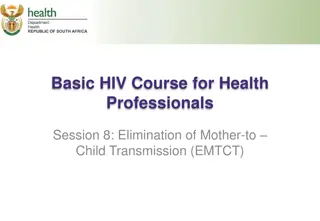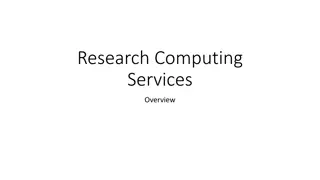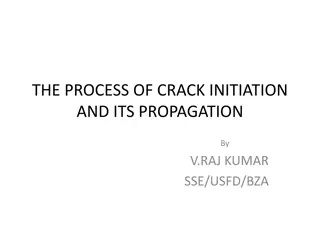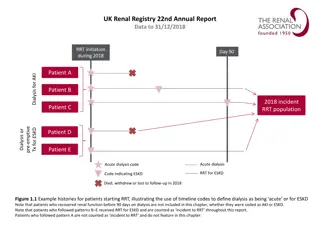Prior Exposure to Antiretroviral Therapy in Adult HIV Patients in Sub-Saharan Africa
A systematic review was conducted to assess the proportion of adult HIV patients in sub-Saharan Africa with prior antiretroviral therapy experience, specifically focusing on non-naive re-initiators. The study highlighted the challenges faced by these individuals and the need for tailored interventio
0 views • 11 slides
Mortar Board Initiation Tips & Tricks Advisor Meet-Up
Learn about the significance of initiation in Mortar Board, get insights into planning virtual and in-person initiations, and explore the resources available in the Initiation Handbook. Discover the guidelines for participants, attire, regalia, and program elements to make your event memorable. Don'
3 views • 8 slides
Hospital-Based Rapid Methadone Initiation Protocol in Fentanyl Era
The study explores the implementation of a rapid methadone initiation protocol in a hospital setting to address the challenges posed by fentanyl in opioid use disorder treatment. The team's experience over nine months following the protocol's introduction is detailed, highlighting the importance of
2 views • 22 slides
UCC Research Support and Strategies Overview
UCC's Research Support, Policy & Strategy function, led by David O'Connell, PhD, provides comprehensive support for research activities at the university. The office manages research funding, monitors performance, and facilitates engagement with external stakeholders. UCC's involvement in Horizon Eu
3 views • 17 slides
Overview of Research Problem Identification and Formulation
Understanding the importance of defining a research problem, this content delves into the selection and formulation of research problems, the definition of a research problem, reasons for defining it, methods for identifying research problems, sources of research problems, and considerations in sele
1 views • 11 slides
Optimizing Antibiotic Use in Treating Infections
Antibiotics are vital for treating and preventing infections, but research shows they are often prescribed unnecessarily or misused. Evidence-based guidelines from IDSA can assist in choosing the right therapy based on accurate infectious disease diagnosis and microbiological understanding. Proper s
1 views • 51 slides
Regional Trip Rates Variation in TRICS Owen Edwards Consortium
Past research by Owen Edwards Consortium on trip rates variation in TRICS regions led to the initiation of a new research phase to confirm or confront previous findings. The importance of factors like location type, local population, and vehicle ownership in determining regional selection was highli
0 views • 59 slides
Understanding Research Paradigms in Qualitative Medical Research
Delve into the world of research paradigms in qualitative medical research with a focus on the key differences between objective and subjective research, the meaning of research paradigms, components of research paradigms, types of research paradigms, and how paradigms guide the selection of researc
0 views • 42 slides
Guidelines for Selecting Research Project Topics in Environmental Health
Research is crucial for addressing environmental health issues. Choosing a good research topic is the first step towards effective research. This paper discusses the meaning, characteristics, types of research, and the research process to help in selecting appropriate research topics. Understanding
0 views • 15 slides
Understanding Free Radical Polymerization Kinetics
This lecture covers the kinetics of free radical polymerization, including initiation, propagation, termination, and kinetic chain length concepts. It explains the calculation of kinetic chain length and chain-transfer reactions. Key points include the rate equations for initiation, propagation, and
0 views • 11 slides
Initiating and Planning Systems Development Projects
The lecture covers the key steps involved in initiating and planning systems development projects, such as assessing project feasibility, building project plans, and structured walkthroughs. It delves into the decision-making process between project initiation and planning, the effort required for t
2 views • 56 slides
Strategic Innovation in Emergency Care Research Network (SIREN)
SIREN is a collaborative network enabling high-quality, multi-site clinical trials for patients with neurologic, cardiac, respiratory, hematologic, and trauma emergencies. It consists of Clinical Coordinating Center, Data Coordinating Center, and 11 Clinical Centers with affiliated satellites. The n
1 views • 12 slides
Eta Sigma Gamma Zoom Initiation Guidelines
Hosting a remote initiation ceremony for Eta Sigma Gamma using Zoom is crucial during the pandemic. Follow the outlined steps for a seamless ceremony preparation and execution, ensuring the significance of the event is maintained. Key elements such as rough schedule, necessary materials, and new ini
1 views • 8 slides
Understanding Protein Synthesis and Translation Process
Proteins play a crucial role in various body structures and functions. The process of translation, as per the central dogma, involves converting genetic information from DNA to functional proteins through transcription and translation. This process includes initiation, elongation, and termination st
1 views • 25 slides
Clinical Trial Comparison of Immediate vs Deferred Antiretroviral Therapy in HIV-Infected Individuals
This study compared immediate initiation of antiretroviral therapy (ART) with deferred treatment in HIV-infected individuals with CD4+ count >500 cells/mm3. Results showed a significant reduction in primary composite endpoint events in the immediate ART group compared to the deferred ART group. Seri
0 views • 4 slides
Comprehensive Guide to Antiretroviral Therapy Initiation and Adherence
This module provides current recommendations and best practices for initiating antiretroviral therapy (ART), emphasizing treatment benefits, prevention strategies, and maximizing patient outcomes. Learn about the health advantages of ART, including reduced AIDS-related mortality and enhanced quality
0 views • 16 slides
Initiation Ceremony for New Eta Sigma Gamma Chapter Members
Witness the initiation ceremony into the Eta Sigma Gamma collegiate chapter, where new candidates are introduced and inducted with solemn rituals and historical significance. From the candle-lit entrance to the recitation of pledges, experience the traditions and values upheld by this esteemed profe
0 views • 27 slides
NSF CRII Research Initiation Initiative Overview
The NSF CRII program aims to support early-career faculty in computer and information science and engineering by fostering research independence. Eligible applicants should be untenured and within the first three years of a tenure-track or equivalent position. The program focuses on encouraging expl
0 views • 20 slides
NSF CISE Research Initiation Initiative (CRII) Webinar Summary
The NSF CISE Research Initiation Initiative (CRII) Webinar on Solicitation 14-562 for Computer and Information Science and Engineering provides details on program goals, eligibility criteria, areas of interest, submission and review processes, frequently asked questions, and program director contact
0 views • 20 slides
Transcription Initiation and Elongation in Eukaryotes Explained
Transcription initiation in eukaryotes involves RNA Polymerase II, general transcription factors, and Mediator complex to communicate with activators. Chromatin remodeling complexes and histone-modifying enzymes play pivotal roles in transcription regulation. Elongation requires different factors an
0 views • 18 slides
Overview of RNA Transcription Process
The process of RNA transcription involves three main stages: initiation, elongation, and termination. Initiation starts with RNA polymerase binding to a promoter, followed by the formation of a transcription initiation complex. Elongation involves RNA polymerase untwisting the DNA helix and adding n
0 views • 17 slides
Understanding RNA Polymerases and Transcription Process
RNA polymerases play a crucial role in synthesizing cellular RNA through transcription, where RNA is created from a DNA template. This process involves specific requirements such as a DNA template, ribonucleoside triphosphates, and divalent metal ions. RNA polymerase catalyzes the initiation and elo
0 views • 15 slides
Why Care About REEport: Project Initiation, Annual Reporting, Financial Reporting
Understanding the importance of REEport is crucial for project directors as it involves project initiation, annual reporting, and financial reporting. These reports are essential for demonstrating the value of federal funds, planning purposes, and generating support for projects. Assistance and reso
0 views • 25 slides
Rapid Initiation of Antiretroviral Therapy for Newly Diagnosed HIV+ Patients
Providing same-day observed antiretroviral therapy (ART) to newly diagnosed HIV+ outpatients is crucial for improved virologic suppression. Early initiation of ART post-diagnosis enhances patient outcomes, reduces transmission risk, and suppresses viral load effectively. Milestones of care at San Fr
0 views • 20 slides
Rapid ART Initiation Guidelines for Managing HIV Infection
This guideline by NYSDOH AIDS Institute outlines recommendations for rapidly initiating antiretroviral therapy (ART) in patients with HIV infection. It emphasizes prompt initiation of ART based on patient characteristics, even prior to confirmatory testing results. The guideline also stresses the im
0 views • 28 slides
PrEP Uptake Among Female Sex Workers in Zimbabwe During COVID-19 Lockdown
Hypothesized peer-led community-based provision of PrEP services positively influenced PrEP uptake among female sex workers in Zimbabwe. Despite national commodity shortages, PrEP initiation rates peaked at 51% in September 2020, with 33.7% of 19,407 sex workers initiating PrEP. The highest initiati
0 views • 9 slides
The Hero's Journey: Embracing Transformation and Adventure
Embark on the timeless narrative of The Hero's Journey, where separation, initiation, and transformation lead to a triumphant return. Explore the pivotal stages of the Call, Threshold, and Initiation, encountering guardians, helpers, challenges, and tempters along the way. Delve into the Abyss, wher
0 views • 19 slides
Project Management Essentials: Stakeholder Engagement and Project Initiation
Explore the key concepts of stakeholder engagement and project initiation in project management. Learn about identifying stakeholders, setting project goals, defining scope, and understanding the importance of involving stakeholders from the start to ensure project success.
0 views • 30 slides
Characterization of 3G Control-Plane Signaling Overhead
This study focuses on characterizing the control-plane signaling overhead in 3G networks caused by the initiation and release of radio resources with raw IP data packets. It explores the impact of massive signaling messages triggered by data transfer on 3G networks, aiming to validate a data-plane a
0 views • 22 slides
IEEE 802.11-17/1338r0 - September 2017 TWT SP Initiation and Termination
This document, authored by Jarkko Kneckt from Apple, discusses the September 2017 TWT SP initiation and termination processes, focusing on high throughput and power efficiency for 802.11ax devices. Legacy power save mechanisms in parallel with TWT mechanisms are explored, along with issues related t
0 views • 15 slides
Home Office Delivery Readiness Assessment Lifecycle
The readiness assessments aim to enhance visibility and scrutiny of new programs and projects within the Home Office change portfolio. These assessments support project initiation, deeper scrutiny of investment proposals, and assure closure and transition plans to Business as Usual. They involve key
0 views • 11 slides
Sacraments of Initiation and Vocations in the Catholic Church
Explore the beautiful rituals of Baptism, Confirmation, Marriage, and Holy Orders in the Catholic Church, each marked by symbols, promises, anointing, and a deep spiritual commitment. Discover the essence of welcoming, initiation, commitment, and service in these significant sacraments.
0 views • 16 slides
Project Initiation Document for [Insert.Project.name] [Insert.Project.number]
This project initiation document outlines the strategic fit, benefits, delivery schedule, specific risks, cost breakdown, project overview, delivery timelines, and key project information for [Insert.Project.name] [Insert.Project.number].
0 views • 19 slides
Essential Information for Elimination of Mother-to-Child Transmission (EMTCT) in HIV
This session covers comprehensive guidance on managing HIV-infected pregnant women throughout preconception, antenatal, labor, and postnatal periods. It includes information on testing algorithms, ART initiation, viral load monitoring, prophylaxis for HIV-exposed infants, and the importance of breas
0 views • 46 slides
Prospective Cohort Study on Acute HIV Infection in Bangkok
The study focuses on initiating combination antiretroviral therapy for all HIV-infected individuals to preserve the CD4+ T cell population, restrict viral reservoir seeding, and minimize viral evolution. Rapid suppression of HIV viraemia in patients could lead to potential candidates for future cure
0 views • 12 slides
Comprehensive Guidelines on PrEP for HIV Prevention
These guidelines aim to increase awareness and knowledge of PrEP efficacy, assist clinicians in identifying candidates for PrEP, address barriers to access, and provide evidence-based recommendations for PrEP initiation, management, monitoring, and more. Key points include same-day initiation of PrE
0 views • 60 slides
Research Computing Services Overview and Support Summary
Research Computing Services at the institution provide a range of support including staff listings, needs survey development, peer institution comparisons, faculty surveys, and areas of support like consultation, data, HPC, and digital humanities. The team is involved in survey initiation, review, a
0 views • 11 slides
Understanding the Process of Crack Initiation and Propagation
The process of crack initiation and propagation in materials is essential to comprehend for assessing fracture risk. This involves calculating defect sizes using fracture toughness values and understanding how cracks develop under repeated stresses, leading to fast fractures. The direction of crack
0 views • 36 slides
UK Renal Registry 22nd Annual Report Data (2018)
The UK Renal Registry's 22nd Annual Report Data to 31/12/2018 provides detailed insights into various aspects of renal replacement therapy (RRT) initiation, incidence rates, primary renal diseases, RRT modalities, and more. The report includes figures illustrating RRT initiation patterns, adult RRT
0 views • 32 slides
Exploring Research Design and Funding Priorities in Northern Ireland
Dive into the world of research at the upcoming Application and Research Design Workshop scheduled for Friday, 28th May 2021. Discover the strategic priorities driving impactful research initiatives, learn about current research projects, funding processes, and collaborations. Explore the rich histo
0 views • 37 slides







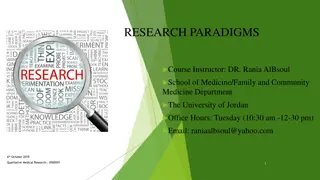


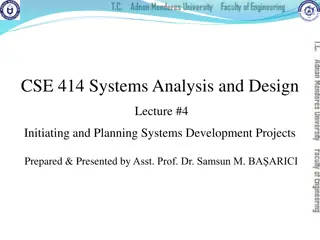


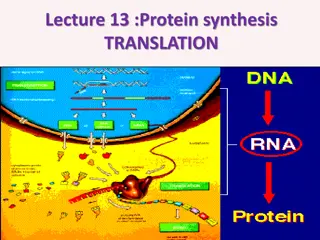
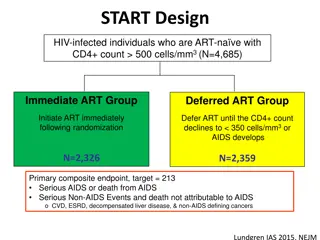
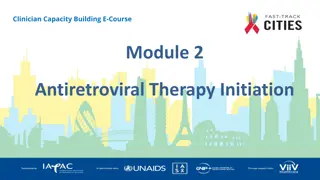


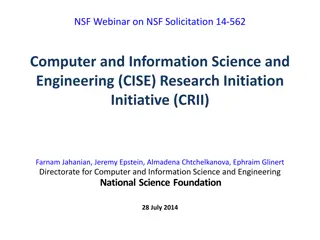





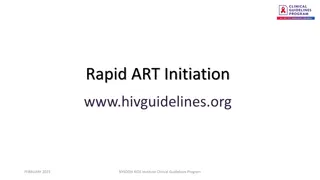

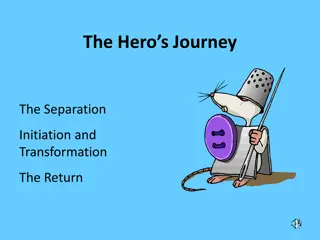


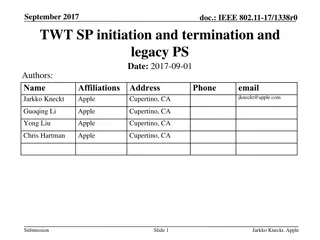


![Project Initiation Document for [Insert.Project.name] [Insert.Project.number]](/thumb/226757/project-initiation-document-for-insert-project-name-insert-project-number.jpg)
